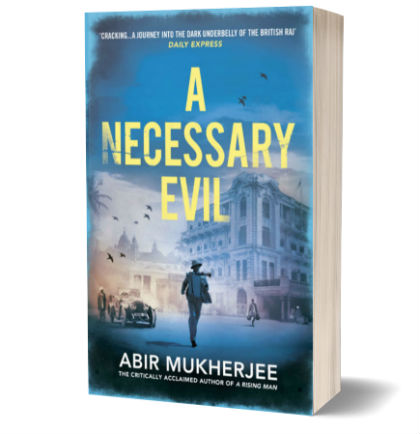We introduced Abir Mukherjee and his ex-Scotland yard detective Sam Wyndham in our review post on his first book A Rising Man. We enjoyed this murder – mystery set in Calcutta of post-“World War I” years, when it was the centre of British Raj in India.
| Book Title | : | A Necessary Evil Sam Wyndham Book 2 |
| Author | : | Abir Mukherjee |
| Publisher | : |
Vintage (26 March 2018) Vintage Digital (7 June 2018) |
| # of Pages | : |
384 (Paperback) 4295 KB; 380 (1 June 2017) |
| # of Chapters | : | 48 |
| Purchase Link(s) | : |
The book had been a commercial success and so has been followed by two further installments featuring Sam Wyndham and Surendranath Banerjee. We read the second book in the series called “A Necessary Evil” recently, and here are our thoughts on this book on behalf of Team Thinkerviews.
This Is Here In For You
Book Cover:
Let us take a look at the cover page of the book.

A Necessary Evil by Abir Mukherjee | Book Cover
As you can see the cover page of the latest edition of the book is quite attractive. A man wearing a western suit and hat is seen coming from a posh area of a megacity. As, a large part of the story is explored in Kolkata, that too in British rule time, we can see buildings with the old style in the background, making it more authentic. The shades of blue used for the cover page makes it look rich. Interestingly the same image (a suited person running forward) is used in the cover page of the next book too.
Overall, I like the cover page.
Storyline:
It is the 27th day of Ashadha – Friday 18th June, 1920 – the very first day of the Jagannath festival in Calcutta (now Kolkata). We meet Captain Wyndham and Seargent Banerjee at a reception for kings and princes of Eastern India as they attend the talks regarding establishing a chamber of princes – an equivalent of House of Lords. They are here to meet Prince Adhir – Yuvraj of the state of Sambalpore located in modern day Orissa. Prince Adhir was at school with Surendranath Banerjee’s elder brother and has asked to meet our detectives to discuss the warnings he has received about how his life is in danger.
As Prince Adhir, his ADS Colonel Arora, Sam and Surendranath travel in the Prince’s car towards his hotel for a detailed chat, the prince is assassinated right in front of the other three, by a saffron clad Sadhu. Sam gives a chase, but the killer disappears in the vast chaos of a Rath Yatra passing through Dharamtollah.
Sam and Surendranath are shocked, then severely reprimanded by their boss commissioner Taggart. Eventually, they track the killer in a small hotel near Howrah station. But, when he has no route of escape left, he shoots himself. Case Closed – or so it is as far as the British are concerned.
Sam, however, does not like loose ends. He engineers a visit to Sambalpore to pay the last respects to Prince Adhir purely in personal capacity, as the British has no jurisdiction in Sambalpore. Once in Sambalpore, the Maharaja grants them permission to track down his son’s killer.
And so the journey begins. As the players are introduced one after the other – Prince Punit appears to have the biggest motive as he is now in line for the throne. The royal force has captured the local school teacher as the primary suspect and Sam meets her in prison, but is not convinced of her guilt. We meet the powerful women of the family including the eldest Maharani Shubhadra, the young Maharani Devika, Prince Adhir’s wife Gitanjali and rest of the zenana filled with hundred of concubines and their offspring. Sam also discovers that Prince Adhir had a mistress from UK – Miss Katherine Pemberly, who could have become his wife in time, had the prince lived.
On the British side, there are the Carmichaels – resident in Sambalpore as representative of the British, Mr. Golding – an accountant who keeps the ledgers for the state of Sambalpore, and who disappears mysteriously after he expresses a wish to meet Sam in private. Colonel Arora seems to be Sam’s only ally – not only while he attempts to navigate the insides of the palace, but also to track Opium when Sam is craving a hit.
As Sam feels increasing confused with every passing day and with each interview, matters are made worse when during a hunting trip, Sam ends up saving Punit from a murder attempt and so loses his prime suspect. Meanwhile, Sam’s love interest from the previous book – Annie Grant is invited to Sambalpore by the royal family and is courted by Prince Punit.
A wild theory shapes itself in his mind, and in a moment of reckless thoughfulness, he shares it with Colonel Arora. Things get out of hand quickly after that and Sam ends up with blood on his hand – that of innocents or complicit in this conspiracy – he is not sure.
He is kicked out of Sambalpore, but his instincts won’t let him leave. He comes back only to witness another murder. Will he find the truth this time?
It is a delight to delve into the history and try to re-live it through the imaginary world that is based in facts and yet alive with perspectives and learnings that are old and new. After the success of a href=”/books/english-books/a-rising-man-by-abir-mukherjee-book-review/” title=”A Rising Man by Abir Mukherjee | Book Review”>The Rising Man, which featured Kolkata and the freedom struggle in some of major forces in the background, Abir Mukherjee focuses on a different and yet vital part of the British Raj in India – the local kings and princes – the Desi rajas and how the British affected them personally as well as in their ruling capacity.
The age old story of cunning, intrigue and treachery which was pivotal in changing fortunes of many Indian royalties and the rise of their kingdoms while their neighbours fell is portrayed quite neatly through the rise of Sambalpore on the back of its diamond and coal reserves.
The breath-taking beauty of modern day Orissa and its widespread poverty have not come that long a way from the days portrayed here. Although it is true, it is hard to re-visit how the British way of life was considered “Civilised” and their affectations from dining to dancing to dressing were adapted by the rich Indians – however unsuited those were to our climate and culture. But, sometimes you have to bow to the rising sun if you don’t want to get scorched, and so our kings and princes were educated in British public schools and learnt the British way of life. As the author says:
I’ll say one thing for you British, you certainly know how to appeal to our vanity. We’ve surrendered this land to you and for what? A few fine words, fancy titles and scraps from your table over which we bicker like bald men fighting over a comb.
And while the fancy titles were preserved, the wealth of this nation was drained through the commercial and beuraucratic means, while the ruling machinery tried their best to maintain a status quo:
The Viceroy might be the most powerful man in India, overlord to hundreds of millions, but in the grand scheme of things, he was just a functionary who took his orders from Whitehall. All he was really interested in was keeping his nose clean and serving out his time as Governor – General without the Raj collapsing around him. They might assume the mantle of demigods, but in truth, the only thing that’s mattered to them since the time of Lord Curzon, is to keep the plates spinning until they can move on. No one wants to be remembered as the man in charge when the music stopped – the man who lost India.
And while the kings and queens and viceroys played the game of musical chairs, the life of common man was worse for wear. In these tough times, it took a lot of devotion and courage to keep our traditions alive. The whole book revolves around the worship of Lord Jagannath in Orissa and his Rathyatra festival. As you may know, he is a god residing in Orissa with his brother Balabhadra and sister Subhadra. There are many versions of the story of how Lord Jagannatha came to Orissa in a flood in Mahanadi – one of the popular versions being that he is Krishna who came to rest in Orissa with Balarama and Subhadra. The idols of this deity are made of wood rather than stone and feature only head and torso leading British researchers to believe that they were the gods of Adivasis absorbed in the mainstream Hindu arena of Gods. Whatever may be the case, the fact remains that the Jagannath Rathyatra remains one of the biggest festivals even in modern day India and the devotees will lay their lives to carry the Lord and his chariot on their shoulders. It was a novelty for the British and as usual they had to twist the pronunciation before they could get it in English :):
The Rath Yatra – the progress of the chariot of the Hindu deity, Lord Jagannath. Each year his chariot is pulled through the streets by thousands of devotees. At some point, the British confused the name of the God with his chariot. It’s from him that we derive the English word juggernaut.
The Hindu temples are a lot richer in imagination than anything that a British conservative could conjure in their minds. No wonder they found our religious metaphors and allegories so confusing:
I saw that the edifice was embellished with the most graphic of carvings, gods and mortals intertwined in the sort of positions that your local vicar would probably never have imagined, let alone countenanced plastering all over the front of his church. And Yet a vicar would be perfectly happy with gargoyles or stained-glass depictions of the damned burning in hellfire. It made me think. Why was it that we Christians seemed so squeamish about portraying scenes of love? What were our cardinals and archbishops so afraid of?
Although it may seem simple and part of our daily lives, it is through such daily rituals, that the cultures are preserved and the cultural identities are passed on from one generation to another. While the men’s world may change to suit the outside invasions, the women’s world tightens up within and even more gates are put in place to leave the home lives as untouched as possible. Who then actually rules:
Do you think a woman cannot lead a nation? Would you believe me if I told you that the opposite was true? For two hundred years, your people have wielded a malign power over India, corrupting our rulers till they are no more than your faceless lackeys. In such a world, it is us, the women of the zenana, safe in our sanctuary beyond the pernicious reach of your residents and your advisers, who have been the guardians of our culture and heritage.
Although this comes with the price of freedom, especially for non-privileged women. But let’s not forget the big role women played outside the zenana and in the Indian independence movement. The author highlights the subtle balance of power and suppression of the British times in India through the wide range of female characters here.
In spite of this rich background of royal intrigue and festive celebrations, the core of the book is still Sam’s journey as he comes to terms with India and his role here. He is still struggling with his past, his opium addiction and the depression. Some of the best bits of this book are where he attempts to learn the many facets of how truth and justice are not always as straightforward as cause and effects and if he were to make a choice, what would he ask for:
India is home to many faiths and they all agree that the soul is the true essence of our being. Everyone’s soul is unique, and different souls are driven by different passions, but certain souls are driven by higher calling, which the must follow no matter what the consequences. I believe your soul is that of a satyanveshi, a seeker of truth.
– – – – – – – – – – – – – – – – – – – – – – – – – – – – – – – – – – – – – – – –
The truth and its consequences are two different things. Truth does not entail justice any more than high birth entails wisdom. You may not even recognise justice when you see it.
– – – – – – – – – – – – – – – – – – – – – – – – – – – – – – – – – – – – – – – –
Loose ends – throwaway words, but to me they represented truth untold and justice denied. One thing the war had taught me that there was precious little justice to be found in this world, and anything I could do to further its ends was probably a good thing.
The hardest part, however, is not to face the external fears, but to find that he harbors the same prejudices that he would find contemptible in others:
Sambalpore had taught me that I was no more a seeker of truth than I was a canary. The truth, when it challenges my perceptions, was just as unpalatable to me as it was to anyone else.
I also like the author’s pithy comments on the human behaviour:
It’s a fact that an Englishman abhors sharing his intimate thoughts.
– – – – – – – – – – – – – – – – – – – – – – – – – – – – – – – – – – – – – – – –
Some bemused onlookers, others running towards the confusion. All of us caught up in the malestorm: wanting to be part of something bigger to feel the excitement and the emancipation that comes from being part of the mob.
Summary:
The book has a few areas where I felt that the characters behave a bit ‘out-of-time’ and some of the sequence of events could have been a bit tighter, but it is an enjoyable historical detective read that touches many aspects of Indian and British lives as it were then. There is a fair bit of predictable royal antics on display including hunting trips and so on, which will be a bonus for the international readers. But I enjoyed the book for its depth of thoughts and characters that bring to life certain aspects of British rule in India including the day to day running of it.
Quick Purchase Links:
- Buy Book From Amazon India – Paperback
- Buy Book From Amazon India – Kindle EBook
- Buy Book From Amazon US – Paperback
- Buy Book From Amazon US – Kindle EBook
Over To You:
If you already have read the book do share your remarks and thoughts via comments below. Does this review help you in making your decision to buy or read the book? Do not forget to share this article with your friends over various social networks via Twitter, Facebook and others. And yes, you may like to subscribe to our RSS feeds and follow us on various Social networks to get latest updates for the site to land right in your mail box.
 ThinkerViews – Views And Reviews Personal views and reviews for books, magazines, tv serials, movies, websites, technical stuff and more.
ThinkerViews – Views And Reviews Personal views and reviews for books, magazines, tv serials, movies, websites, technical stuff and more.



